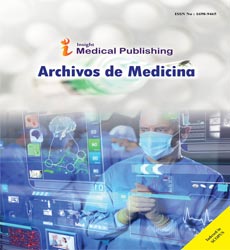Abstract
Intoxicacion por Litio Como Causa de Inicio Prioritario de Hemodialisis: A Proposito de un Caso
Lithium intoxication, a rare clinical entity, represents a major cause of mortality in patients with bipolar spectrum disorder. Its clinical manifestations include a heterogeneous spectrum of symptoms within which neurological, gastrointestinal, cardiovascular, and renal involvement stand out, its complications becoming lethal if a timely diagnosis and management is not established. Given the high frequency of its use as a treatment for psychiatric pathologies and its narrow therapeutic range that favors the appearance of toxicity, frequent monitoring of its circulating levels constitutes a fundamental pillar in the prevention of the appearance of its multiple adverse effects. Patients with severe poisoning require emergent hemodialysis because through this intervention an early therapeutic option is provided that helps with the good prognosis of these patients by reducing the levels of litemia to safety ranges. We present the case of a 54-year-old female patient, with a history of bipolar disorder for 7 years under treatment with lithium carbonate, who presented severe intoxication, with neurological compromise, which required early hemodialysis as a measure to eliminate lithium in blood, with satisfactory evolution and hospital discharge.
Author(s):
Dagoberto Serpa, Victor Leal, Jorge Rico, Rodrigo Daza, Nehomar Pájaro, Maria Raad, Emilio Abuabara and Ingrid
Benitez
Abstract | Full-Text | PDF
Share this

Abstracted/Indexed in
- Google Scholar
- Genamics JournalSeek
- China National Knowledge Infrastructure (CNKI)
- CiteFactor
- Scimago
- Electronic Journals Library
- Directory of Research Journal Indexing (DRJI)
- WorldCat
- Proquest Summons
- University Grants Commission
- Geneva Foundation for Medical Education and Research
- Secret Search Engine Labs
Open Access Journals
- Aquaculture & Veterinary Science
- Chemistry & Chemical Sciences
- Clinical Sciences
- Engineering
- General Science
- Genetics & Molecular Biology
- Health Care & Nursing
- Immunology & Microbiology
- Materials Science
- Mathematics & Physics
- Medical Sciences
- Neurology & Psychiatry
- Oncology & Cancer Science
- Pharmaceutical Sciences

